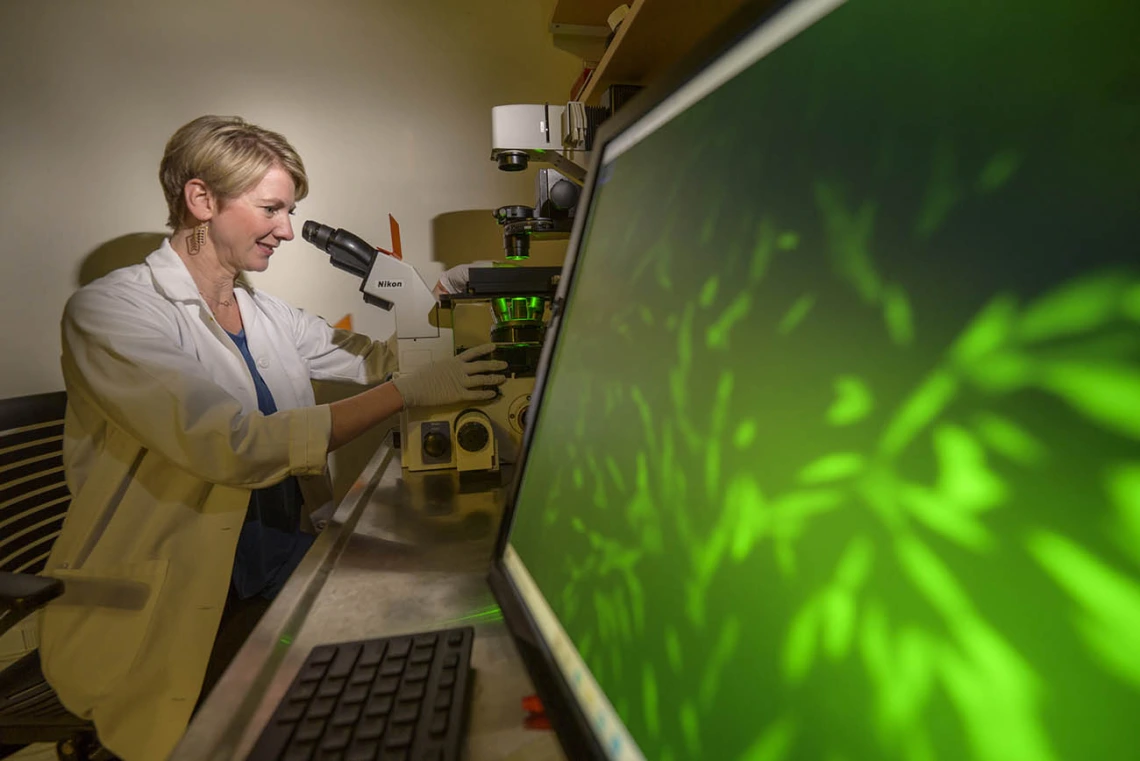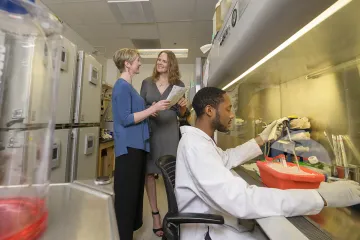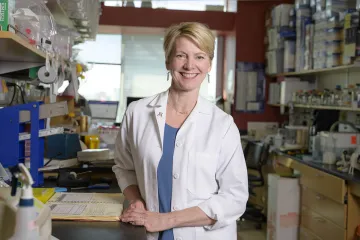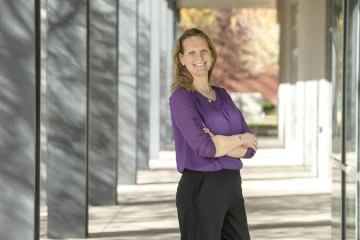Researchers Determined to Prevent Viruses From Winning
Under the shadow of increasing viral threats, researchers at the Aegis Consortium are working to create a pandemic-free future.

Felicia Goodrum, PhD, co-leads Pandemic Control, Prediction and Preparedness, one of three research areas of focus for the Aegis Consortium.

Felicia Goodrum, PhD, and Kacey Ernst, PhD, MPH, say the early detection of disease outbreaks will be crucial to the development of public health responses.
There has been a rise in the rate of pandemic-threatening viruses in the last century, which has seen about 10 outbreaks with the potential to reach pandemic levels. The COVID-19 and Zika pandemics, plus significant outbreaks of mpox and Ebola, all happened within the last decade.
Experts at the University of Arizona Health Sciences say the troubling trend has several contributing factors, including the explosion of the world population from around 1 billion people in the early 1800s to around 8 billion today. The surge of humanity has led to the encroachment of civilizations on natural animal habitats.
“We’re putting wild animals and humans in much closer contact,” said Felicia Goodrum, PhD, Aegis Consortium researcher and professor in the UArizona College of Medicine – Tucson’s Department of Immunobiology. “Every time we do that, we are increasing the opportunity for the virus to then jump from a bat or some other animal into the human species.”
On top of these realities, climate change is having a wide range of effects, said Kacey Ernst, PhD, MPH, Aegis Consortium researcher and professor at the Mel and Enid Zuckerman College of Public Health.

According to the Centers for Disease Control and Prevention, every year tens of thousands of Americans get sick from zoonotic diseases that spread between animals and people, such as West Nile virus, salmonellosis, rabies and Lyme disease.
“It is like throwing a rock into a lake and watching where the ripples go,” Dr. Ernst said. “From migration patterns to changing population structures, there are a lot of different social, economic, and biological pathways of disease transmission that climate change is influencing.”
Despite myriad challenges, experts say it is possible to fight back against an accelerating assault of viruses. Drs. Ernst and Goodrum are doing just that as leaders of “Pandemic Control, Prediction and Preparedness,” one of three research areas of focus for the Aegis Consortium.
In Greek mythology, an aegis is a shield or breastplate. Like a shield, the Aegis Consortium is concerned with protection. As a strategic initiative of UArizona Health Sciences, the Aegis Consortium unites a diverse coalition of experts across multiple disciplines all working to find solutions for a pandemic-free future.
“Aegis brings together people studying viral emergence, climate change, built environments, the immune response to viral infections and virologists like myself studying infectious diseases to address viral threats,” Dr. Goodrum said.
Examining pathogen evolution and escape

Dr. Goodrum joined the University of Arizona Health Sciences faculty in 2006. She has spent much of her career examining the complex interaction between viruses and their host.
The COVID-19 pandemic provides a real-time example of the work being done in pathogen evolution and escape. Scientists, including those at the University of Arizona, are studying extended illnesses associated with COVID-19 and the immune responses in various groups of people. Advanced laboratory and modeling techniques are being used to improve tests and to track the virus’s ability to evade the immune system and cases of reinfection. Researchers are also studying how viruses are able to jump species.
“It is viral evolution by which viruses move into a new species,” said Dr. Goodrum, who is also a member of the university’s BIO5 Institute. “We really have to understand the changes that are happening across the viral genome that is allowing them to enter a new species and begin to transmit.”
The knowledge researchers gain can be used to develop new therapies and methods to protect vulnerable populations now and in the future.
Building better warning systems and responses

Dr. Ernst is an infectious disease epidemiologist who takes an active role working with local health departments. She seeks to understand the reasons behind increasing vaccination exemption rates in Arizona and is working to develop programs to increase vaccination uptake.
Aegis Consortium researchers are also looking into ways of improving public health responses. They are developing systems to monitor communities, simulation models to predict outcomes and strategies to acquire community support.
“Responding to the COVID-19 pandemic taught us many lessons,” Dr. Ernst said. “We want to capitalize on the infrastructure and relationships that have been built. We cannot forget about them until the next pandemic. Instead, we should be investing to enhance and build upon these tools and capabilities to have a ready response for future pandemics.”
Drs. Goodrum and Ernst say the early detection of disease outbreaks will be crucial to the development of public health responses. Wastewater-based tests are one example of an early detection system. The University of Arizona used this technology to quickly identify COVID-19 in on-campus student housing.
“Wastewater is a way to surveil hundreds and hundreds of people without having to do individual testing,” Dr. Goodrum said. “U of A researchers are looking into all sorts of other things as well. They are trying to develop ways of monitoring where fevers are popping up, apps on your phone that tell you when you’ve been exposed to someone who has tested positive, and wearable sensors that monitor your health.”
Understanding the body’s immune response
"Responding to the COVID-19 pandemic taught us many lessons. We cannot forget about them until the next pandemic."
–Kacey Ernst, PhD
Dr. Goodrum says the body’s innate immunity – the defense system we are born with – and the adaptive immune response cannot be underestimated in the fight against new viruses. Aegis Consortium researchers are looking at the immune response to infection and vaccination in different populations to find ways to prepare and strengthen the immune system for future viral attacks.
“When viruses jump species, things can really go wrong. The virus hasn't evolved with the new species and it may result in a ramped-up immune response that is devastating to the host,” Dr. Goodrum said. “That is what happened with SARS-CoV-2 and what often happens with influenza.”
There is no single path to a pandemic-free future; the work being done in the Aegis Consortium makes it clear there are many avenues to pursue to meet that goal. Along the way, coordination within communities and cooperation from the public, Drs. Goodrum and Ernst say, will be essential for success.
“Viruses can evolve much faster than we can,” Dr. Goodrum said. “If the uptake on the mitigation tools is not there, including public health measures and vaccines, then our work is really all for naught.”
Our Experts
Contact
Brian Brennan
Health Sciences Office of Communications
520-621-3510
brianbrennan@arizona.edu

